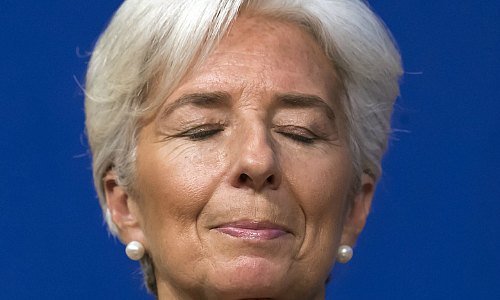ECB, Lagarde & Jordan: Low Rates Forever?
There is no doubting the augurs – the appointment of Christine Lagarde as new head of the European Central Bank won't change the policy of low interest rates in the eurozone. And the Swiss National Bank will remain a hostage to the euro.
Whether the election of a new head of the European Central Bank (ECB) actually makes a difference in terms of monetary policy is anybody's guess. The case of Christine Lagarde (pictured below) seems more a case of the big economic powers (Germany and France) making sure that the key institution of the economic bloc gets a safe pair of hands in troubled times.

(Picture: Keystone)
The quotes of the current head of the International Monetary Fund (IMF) – collected by «Bloomberg» – suggest that the successor of Mario Draghi will continue where Draghi has left off. For instance, she praised negative interest rates as a functioning instrument three years ago.
In March 2019, when it wasn't yet as apparent that the next rate decision would be to cut, she gave her approval in a clear-cut statement. The monetary authorities should use all their tools cumulative in a way to achieve a maximum effect when the next slowdown comes, which she deemed inevitable. It meant that demand needed to be supported by a decisive monetary easing and a fiscal stimulus wherever possible.
In a Distant Future
For financial markets, resigned to the fact that interest rates won't go up this year and quite probably lowered (the U.S. Federal Reserve was very clear in its recent statement), this spelled trouble.
If and when the good old times of government bonds with reasonable yields return, they will do so later rather than sooner. Thomas Jordan, head of the Swiss National Bank (SNB), recently said he (linked article in German) was convinced that Switzerland one day would return to positive rates, but he didn't known when.
Low Rates the Consequence of the Common Currency?
Some say the low rate policy is an intrinsic problem. The capital market strategists at Flossbach von Storch recently concluded that rates will stay low in Europe as long as the euro survives.
The authors argue that the common currency is a burden on the economies of some member states. Higher rates would probably depress an already modest economic performance further, the logic goes.
The Swiss National Bank is maintaining a monetary policy in line with the ECB's in a bid to prevent the franc from rising against the euro. The country hence is unlikely to see higher rates any time soon.
Limits of Monetary Policy
The voices who reject the current dogma are facing an uphill battle. The Wellershoff and Partners economists not long ago warned that low rates and the rate differential had a lesser effect on the franc (linked article in German) than expected. The company of Klaus Wellershoff, the former chief economist of UBS, recently followed through with a new study.
The study questions the inflationary pressures stemming from lower rates and suggests that lower rates may at times even have a deflationary effect. One of the examples given for the phenomenon is the increase in capacity spurred by the supply of cheaper money. The expansion prevents an inflationary stimulus to develop from an increase in demand. The two Wellershoff studies question the main pillar of monetary policy.
Broad Economic Interests
However, the SNB is to be credited for having stopped a further increase of the value of a franc – an increase that in fact hadn't been based on fundamentals. This helped the industrial sector survive in tough circumstances.
The analysis of monetary policy ought not ignore this aspect, not least as a non-economist is about to assume responsibility for the ECB. She no doubt will look at the broader perspective, and include the importance of the manufacturing industry.
Deficit of No Concern?
In April, Lagarde spoke about the «Modern Monetary Theory», a much-maligned theory that suggests states should worry less about deficit limits and boost money supply to kindle investments.
Despite a careful approach in her language, Lagarde pronounced a sense of openness to the principle of fiscal stimulus, a principle that isn't new of course. That would be less in keeping with the concept of the «safe pair of hands», but more in the sense of those who are opposed to the tight deficit rules in the euro region.



























